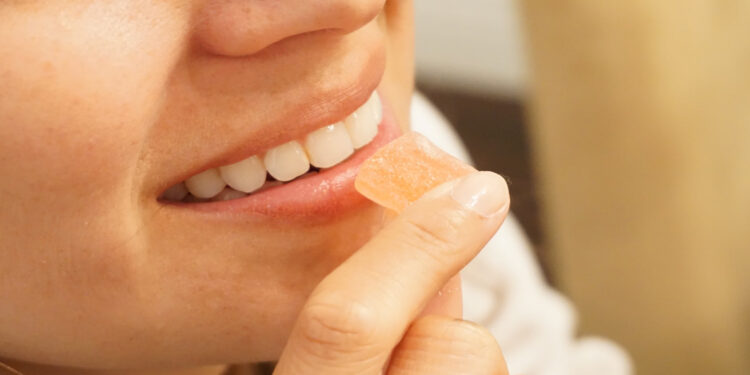Bad Breath: How To Avoid It

Bad breath is an issue few people are willing to talk about. However, it is a common problem, which can be caused by a variety of different factors, such as tobacco products, food, dental hygiene, just to name a few. Some symptoms you may experience include dry mouth, unpleasant odour or taste in the mouth, or white coating on the tongue. Thankfully, there are many reliable ways to improve your breath and keep your teeth healthy at the same time. Today we will cover some key tips on how to ensure your mouth always feels fresh and clean.
Brush And Floss
Poor dental hygiene is one of the most common causes of bad breath and this is why, maintaining a proper routine is key. The sticky build-up on your teeth is called plaque and is what collects bacteria. Similarly, when food particles get stuck between your teeth, they can get broken down by bacteria and add to the problem. As a result, this process releases an unpleasant odour, which can be difficult to eliminate. Therefore, it is important to brush your teeth at least twice a day and floss properly at least once. However, be careful not to overdo it, as this can wear down your teeth.
Quit Smoking
Smoking tobacco cigarettes can be detrimental to your oral health, as it can damage gums, stain your teeth, and cause bad breath. In comparison, vaping is a safer alternative, which has been found to improve oral health instead. Vapekit offers a comprehensive look at how vaping can help you maintain mouth health and keep your breath fresh for longer. While smoking can lead to plaque and tartar build-up on your teeth, vaping does not have the same effect. This means that bacteria are less likely to be produced. Alongside this, the smell of stale smoke and cigarette butts on your clothes will be significantly reduced with vaping.
Use A Good Mouthwash
Using a mouthwash regularly will not only freshen your breath, but it will also add extra protection by getting rid of bacteria. While a fresh minty taste can make you feel better, it is important to choose a mouthwash that kills germs. Instead of just covering up the smell, you should rinse your mouth daily with a mouthwash that aims to stop bad breath at its source. Another effective way to improve your oral health is to swish your mouth with plain water after eating. This will help you get rid of food particles, which may get stuck between your teeth.
Scrape Your Tongue
You may have noticed that there is a coating, which has formed on your tongue. As this coating can be a host of smelly bacteria, it is crucial to get rid of it by gently brushing your tongue with a toothbrush. It is possible that your brush may be too big and will not allow you to reach the back of your tongue comfortably. In this case, it is recommended to use a scraper instead, as this tool is designed to apply even pressure across the whole surface of the tongue area. Tongue scraping can also help you remove food debris, bacteria, and even dead cells.
Avoid Foods That Cause Bad Breath
There are certain foods that may sour your breath, such as onions and garlic. While it is not surprising they have made the list, the odour of these foods can linger long after you have eaten them. Both onions and garlic contain sulphuric compounds, which can get absorbed by your bloodstream. Once absorbed, they can emit a bitter scent from your pores as well. In addition, when you eat dairy, the naturally occurring bacteria on your tongue can feed on the amino acids found in cheeses and milk. As a result, an unattractive and foul odour can be produced.
Keep Your Gums Healthy
It is important to familiarise yourself with the effects of gum disease, which is one of the biggest culprits of bad breath. Also known as gingivitis, this inflammation of the gums can cause them to become red and swollen. If this disease advances, you may experience fatigue, intense pain, bleeding, and fever. Typically, untreated gingivitis can result in the development of periodontitis, which can lead to serious damage to the gum tissue and even tooth and bone loss around the teeth. To prevent gum disease, it is essential to practise good oral hygiene and schedule regular teeth cleanings with your dentist.
See A Dentist
If you suspect that your bad breath may be caused by an underlying health condition, it may be best to consult a dentist. They can then refer you to the right health specialist, who can provide the right treatment option. Otherwise, your dentist will work with you to get better control over this condition. For example, they may recommend a specific mouth rinse to kill the bacteria or toothpaste that contains an antibacterial agent. You may also need to have faulty tooth restorations replaced, as they can be a breeding ground for bacteria.
Consider An Allergy Test
Seasonal allergies are often accompanied by bad breath and this is why you may find that the usual sneezing and runny eyes often come with mouth odour. In a healthy mouth, bacteria is kept in check by saliva production, which reduces the time it has to stick on teeth. However, if you suffer from certain allergies, you may experience dry mouth. As there is not enough saliva to moisten and cleanse the mouth, destructive bacteria can stick around. Therefore, you may want to consider taking an allergy test and determine the cause of your bad breath.
Try Sugar-Free Gums
Sugar-free chewing gum is an effective way of protecting your teeth and gums and reducing bad breath. It gets your saliva flowing while freshening your breath at the same time. As the sugar substitutes found in sugarless gums are safe for your teeth, they do not cause tooth decay. In fact, xylitol, one of the sweeteners used in many brands, can even prevent decay by stopping the growth of bacteria. While chewing sugarless gums cannot treat conditions, such as dry mouth or gum disease, it can help mask bad breath quickly.
Drink Plenty Of Water
Apart from allergies, dry mouth can be caused by a variety of factors. These may include medications, salivary gland problems, connective tissue disorders, and breathing through the mouth. If you don’t make enough saliva, you run the risk of getting tooth decay and bad breath. Therefore, whenever you feel your mouth is getting dry, ensure you drink plenty of water. Water is the best option in this case, as juice and soda can dry out your mouth even more. Also, to moisten the air in your house, you may want to try a humidifier at night.
Change Your Toothbrush Regularly
Using an old toothbrush can result in bacterial overgrowth, enamel damage, as well as bad breath. Not changing your toothbrush in the recommended time can lead to the bristles becoming frayed. As a result, this will reduce their effectiveness at removing plaque and food debris around the mouth. If plaque is not removed, excess bacteria can cause bad breath. A frayed toothbrush may also harbour more bacteria, which can get transferred in the mouth, causing reinfection. It is also advisable to change your toothbrush after a recent illness, such as a cold or flu.
Eat Fruit And Vegetables
Alongside their countless health benefits, fruits and vegetables can also freshen your breath. Some great examples are apples, carrots, and celery, which act as natural toothbrushes to eliminate odour-causing bacteria. Chewing the natural fibrous texture of fruits and vegetables can stimulate the gums and remove plaque trapped between the teeth. Moreover, oranges and in particular high levels of vitamin C promote saliva production, which can wash away bad bacteria. As an added bonus, vitamin C can help improve your gum health by preventing gingivitis.
Reduce Alcohol Consumption
Alcohol carries a distinctive aroma, which can also linger on your breath for a long time. Moreover, alcoholic drinks can also dry out your mouth. As with other causes of dry mouth, less saliva means less protection against odour-producing bacteria. Therefore, it may be beneficial to look at ways of cutting down on alcohol. The best solution to get rid of the smell of alcohol is to maintain good oral care. However, it may not always be feasible to take care of your teeth and gums, when you are out and about. In this case, you may want to use sugar-free mints or gums and drink lots of water.
Eliminate Coffee Breath
Coffee breath can leave you with a dry and uncomfortable feeling in your mouth. This is why, there are many people who find coffee breath unpleasant in themselves, as well as in others. Caffeine can also dry out your mouth, as it is slightly dehydrating. If giving up coffee altogether does not seem feasible to you, there are other helpful techniques you can try. For example, you can brush your teeth immediately after drinking coffee, gargle with mouthwash, or drink a large glass of water. Also, although it may be counterintuitive, drinking your coffee black may be better as opposed to having lots of add-ins.










